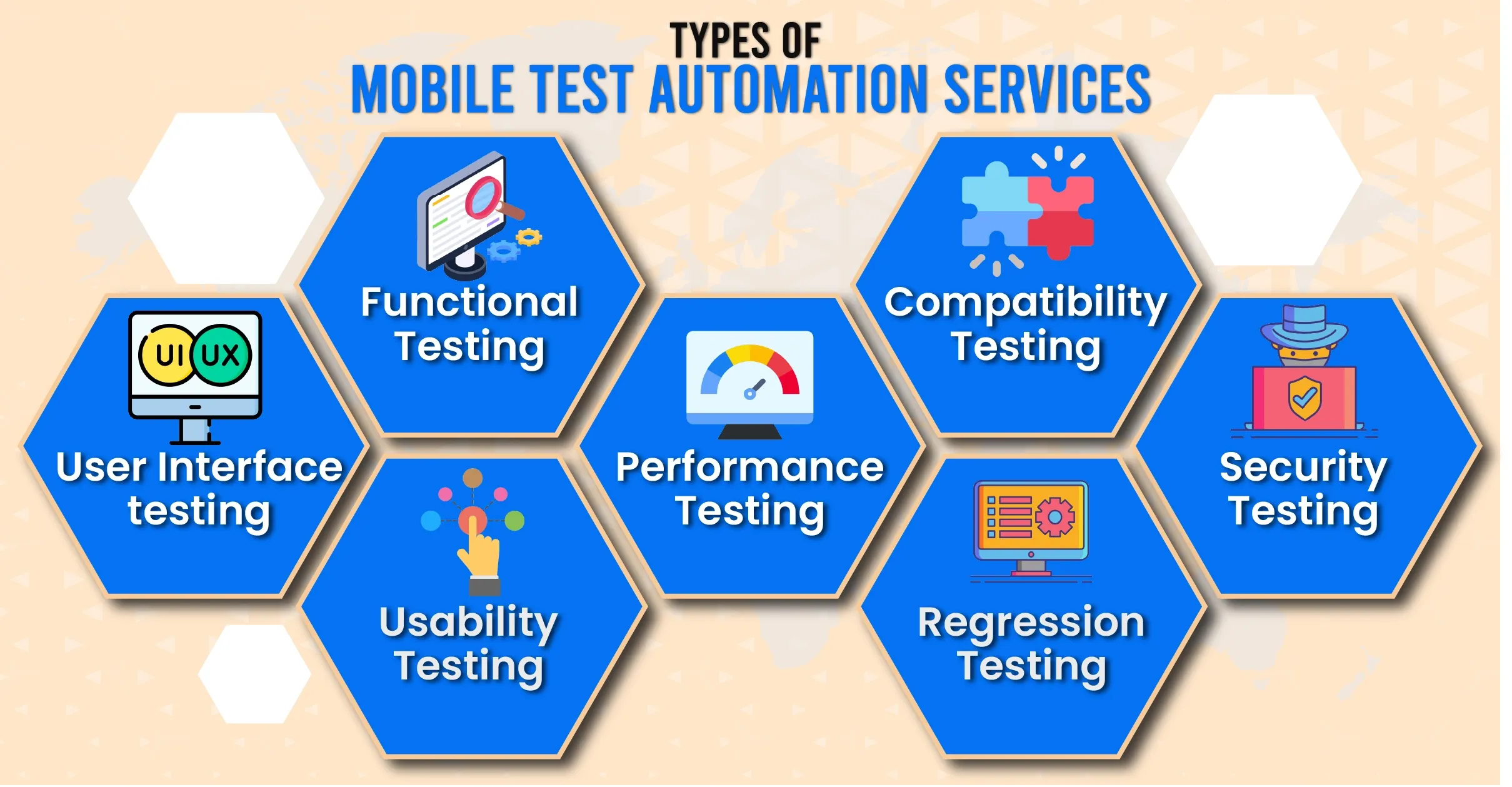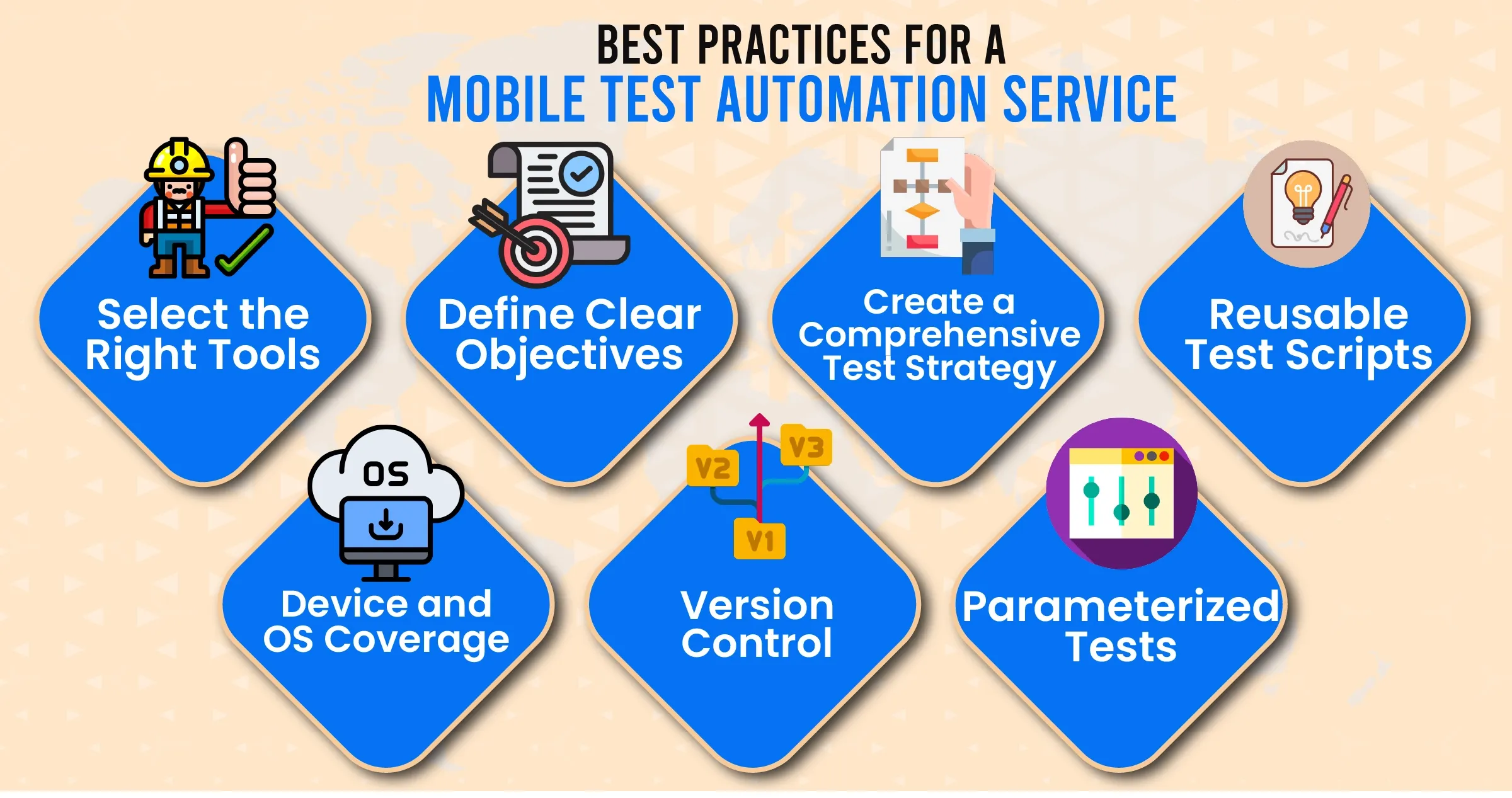

Mobile test automation services are crucial for ensuring efficient, consistent, and reliable app quality across diverse devices and scenarios. It can also speed up testing and bug detection and reduce human errors. But what is it exactly? Why is it important? What are the types of testing under it? Or what are some challenges that you might face with it? We have answered all these questions in our blog. Moreover, we have provided all the details required to implement this automation effectively.
Mobile apps have become an indispensable part of our daily routines. It simplifies tasks and keeps us entertained. But every successful app has a secret world of thorough testing and improvement. A mobile test automation service comes into play here. It puts a lot of effort in the background to make sure the apps we use are responsive and bug-free.
Consider the following scenario: You have downloaded a new mobile app that promises to simplify your life. When you eagerly press the icon, the program suddenly freezes. Additionally, you discover that the buttons are unresponsive. This is making the whole situation irritating. Wouldn't you remove the application?
Now this is something that is a big nightmare for brands, right? To ensure such a situation doesn't occur, a mobile test automation service is essential. But what is it? What are the benefits of it? What are some best practices? Let's find that out in the sections below.
Mobile test automation service is a tool that automatically tests mobile apps. This is to make sure they work correctly on different devices and systems. These automation QA testing services enable developers to simulate user interactions. It also helps perform functional tests and assess performance. Furthermore, it helps find and fix problems quickly before the app is released. Now it holds significance for many reasons. Let’s take a look:
Traditional manual testing may be laborious and prone to mistakes. The testing process is considerably accelerated by mobile test automation services. This is accomplished by running many tests at once. Therefore, it enables speedier bug solutions and shortens the time it takes to uncover problems.
It is practically hard to get extensive test coverage with various devices and displays manually. Hence, the testing may be done using multiple settings and gadgets thanks to automation. Consequently, it guarantees that the software runs well for all users.
Automated tests are executed consistently. Consequently, it gets rid of the unpredictability that human testers introduce. Each test may be repeated with accuracy because of this uniformity. As a result, it makes it simpler to recognize and solve issues.
Automated testing thoroughly investigates all possible routes via a program. Therefore, this finds flaws that may not be noticeable during manual testing. These services produce thorough reports that give developers helpful information. This is to address problems quickly.
Now let’s move forward and look at the types of services associated with mobile automation testing services.
There are different types of mobile app automation testing solutions. Each focuses on a different area of the performance and usefulness of the app. Hence, here are a few common types:
This kind of testing verifies the app's graphical components. This covers how buttons, pictures, and layouts appear and function. This applies to a range of gadgets and screen sizes.
Functional testing ensures that all of the app's features and functionalities operate exactly as they should. Additionally, it requires ensuring that links, buttons, and other interactive features function effectively.
Performance testing evaluates how effectively the software responds to various circumstances. This includes when there are several concurrent users or a sluggish network connection. It aids in detecting problems with responsiveness, stability, and speed.
This testing guarantees that the program functions appropriately on various devices, etc. It's crucial because there are several variations of smartphones and tablets. That also applies to the different software versions available.
A security audit determines if the software is secure and free of flaws. The reason is that hackers may use it against you. Therefore, it's essential for safeguarding user data.
Usability testing determines how straightforward the software is for consumers to use. Additionally, it aids in locating any locations where consumers can become perplexed or upset.
Regression testing ensures that as changes are made to the software, no previously functioning functionalities are inadvertently broken.
So wrapping up with the types here, let’s now look at some of the best practices for an effective mobile test automation service.

To use software quality solutions successfully and produce high-quality apps, a planned strategy is necessary. Hence, here below are some of them:
Select test automation software that is effective for testing mobile applications. Look into and choose tools compatible with the platforms and technologies on which your app is created. Popular choices include Calabash, Appium, Espresso, and XCUITest.
Clearly state the goals of your test. Determine which software features require automation, then rank test cases according to their importance.
Create a thorough test approach. One that specifies the parameters, objectives, schedules, and resources needed. Consider the hardware, operating systems, and user situations that must be supported.
Make sure to create modular, reusable test scripts. Redundancy is reduced in this way. As the software develops, it also makes it simpler to maintain and update testing.
To test your software, blend actual hardware with emulators and simulations. To guarantee comprehensive coverage, consider a variety of devices, screen sizes, and OS versions.
Maintain version control for your automation code and test scripts. Changes are tracked as a result. It also guarantees that you can quickly return to earlier versions if necessary.
Utilize parameterized tests, which execute the same test using several data sources. This also makes it possible to cover many circumstances without creating separate tests.
But you are bound to face some challenges with automated mobile device testing. So let us see what they are so you can tackle them properly.

Mobile test automation services offer numerous benefits. They do, however, also have particular difficulties. So here are some typical challenges:
It is challenging to guarantee constant app performance due to the wide variety of devices, etc. This applies to all possible combinations. So writing tests that account for this variation can thus be difficult and time-consuming.
Test scripts may need to be modified due to frequent upgrades to mobile operating systems and devices. This accounts for updated features, modifications, or compatibility problems.
UIs for mobile apps are frequently dynamic. This pertains to items that change appearance in response to user activities. So careful scripting is needed to create robust tests to cope with these dynamic UI changes.
Apps for smartphones require network access. Additionally, testing in various network scenarios is crucial. As a result, it might be challenging to simulate real-world network settings correctly.
Mobile devices have constrained memory, computational power, and battery life. Therefore, optimizing test scripts to execute quickly and without taxing the hardware is necessary.
For mobile apps, security testing is critical. Automation of security assessments, however, necessitates specialized skills and equipment. So it is a complex undertaking to protect against vulnerabilities. This is while still ensuring data privacy.
Mobile applications occasionally display non-deterministic behavior. Background operations, alerts, or device disruptions are to blame for this. So it is challenging to design robust and repeatable testing because of this.
With this, we will now look at future trends for a mobile test automation service.
Mobile test automation services have intriguing potential for the future. This is because technology is still developing. Future developments in mobile testing are anticipated to be influenced by the trends and orientations listed below:
Integrating testing is increasingly becoming a part of the development process. The emphasis of this "shift-left" strategy is on identifying problems as soon as feasible. It will thus save money and also time when fixing them later.
Emerging technologies like the Internet of Things (IoT), augmented reality (AR), and virtual reality (VR) have gained popularity. Hence, mobile test automation services will need to change. This is to test these novels efficiently and also complicated user experiences.
Performance testing will keep developing, incorporating elements other than speed. For instance, resource optimization, memory utilization, and battery usage. Furthermore, this guarantees a more streamlined and effective app experience.
Mobile test automation services will need to change as cross-platform development frameworks become more widespread. The goal is to test apps across many platforms while maintaining high quality successfully.
It will be more crucial to streamline the process of writing test scripts and automating tests without much coding experience. As a result, more team members can participate in testing efforts.
A mobile test automation service offers seamless operation and prompt issue discovery in mobile apps. They also improve app quality by providing consumers with seamless experiences. This is thanks to their ability to imitate a variety of devices and situations.
Despite ongoing issues with varied devices and quick upgrades, automation has a promising future. This is owing to AI and cross-platform testing. These services affect our online interactions, from developers to consumers. But also, these technologies generate apps that don't only function but also sparkle.
So why are you still waiting? Immediately engage the top QA automation service providers at Appsierra today!